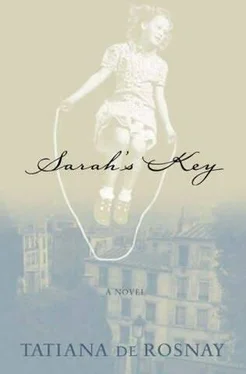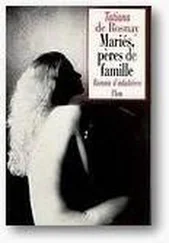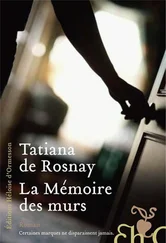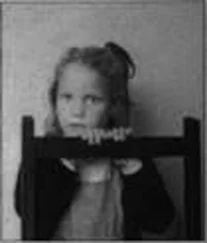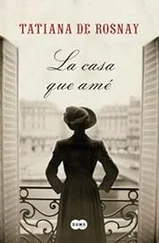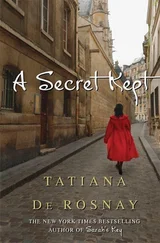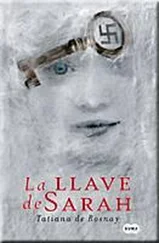She saw her mother stand with the other women. Her mother looked back at her daughter with a tiny, brave smile. She seemed to say, “You see, darling, we’ll be all right, the police said so. You’ll be coming to join us in a few days. Don’t worry, my sweet.”
The girl looked around her at the crowd of children. So many children. She looked at the toddlers, their faces crumpled with grief and fright. She saw the little girl with the bleeding ear lobes, palms outstretched to her mother. What was going to happen to all these children, to her? she thought. Where were their parents being taken?
The women were led away, out through the camp gates. She saw her mother head right and walk down the long road that led through the village to the station. Her mother’s face turned to her one last time.
Then she was gone.

WE’RE HAVING ONE OF our ‘good’ days today, Madame Tézac,” said Véronique, beaming at me as I walked into the sunny, white room. She was part of the staff that looked after Mamé at the clean, cheerful nursing home in the seventeenth arrondissement, not far from the Parc Monceau.
“Don’t call her Madame Tézac,” barked Bertrand’s grandmother. “She hates it. Call her Miss Jarmond.”
I couldn’t help smiling. Véronique seemed crestfallen.
“And anyway, Madame Tézac, that’s me,” said the old lady with a touch of haughtiness, and total disdain for the other Madame Tézac, her daughter-in-law Colette, Bertrand’s mother. So typical of Mamé, I thought. So feisty, even at her age. Her first name was Marcelle. She loathed it. No one ever called her Marcelle.
“I’m sorry,” said Véronique humbly.
I put a hand on her arm.
“Please don’t worry about it,” I said. “I don’t use my married name.”
“It’s an American thing,” said Mamé. “Miss Jarmond is American.”
“Yes, I had noticed that,” said Véronique, in better spirits.
Noticed what? I felt like asking. My accent, my clothes, my shoes?
“So, you’ve been having a good day then, Mamé?” I sat down next to her and covered her hand with mine.
Compared to the old lady on the rue Nélaton, Mamé looked fresh-faced. Her skin was hardly wrinkled. Her gray eyes were bright. But the old lady of the rue Nélaton, despite her decrepit appearance, had a clear head, and Mamé, at eighty-five, had Alzheimer’s. Some days, she simply could not remember who she was.
Bertrand’s parents had decided to move her to the nursing home when they realized she was incapable of living alone. She would turn on a gas burner and let it burn all day. She would let her bath run over. Or she would regularly lock herself out of the apartment and be found wandering in the rue de Saintonge in her dressing gown. She had put up a fight, of course. She hadn’t wanted to come to the nursing home at all. But she had settled in nicely enough, despite occasional outbursts of temper.
“I’m having a ‘good’ day.” She grinned as Véronique left us.
“Oh, I see,” I said, “terrorizing the entire place, as usual?”
“As usual,” she said. Then she turned to me. Her affectionate gray eyes roamed over my face. “Where’s that good-for-nothing husband of yours? He never comes, you know. And don’t give me any of that ‘he’s too busy’ business.”
I sighed.
“Well, at least you’re here,” she said gruffly. “You look tired. Everything all right?”
“Fine,” I said.
I knew I looked tired. There wasn’t much I could do about it. Go on vacation, I guess. But that wasn’t planned till the summer.
“And the apartment?”
I had just been to see the work being done before coming to the nursing home. A hive of activity. Bertrand supervising everything with his usual energy. Antoine looking drained.
“It’s going to be wonderful,” I said. “When it’s finished.”
“I miss it,” said Mamé. “I miss living there.”
“I’m sure you do,” I said.
She shrugged.
“You get attached to places, you know. Like people, I suppose. I wonder if André ever misses it.”
André was her late husband. I had not known him. He had passed away when Bertrand was a teenager. I was used to Mamé speaking of him in the present tense. I never corrected her, never reminded her that he died years ago of lung cancer. She loved talking about him. When I first met her, long before she started to lose her memory, she would show me her photo albums every time I came to see her at the rue de Saintonge. I felt I knew André Tézac’s face by heart. The same gray-blue eyes that Edouard had. A rounder nose. A warmer smile, maybe.
Mamé had told me lengthily how they had met, how they had fallen in love, and how everything had become difficult during the war. The Tézacs were originally from Burgundy, but when André had inherited a family wine business from his own father, he had not been able to make ends meet. So he had moved to Paris and started a small antique shop on the rue de Turenne, near the Place des Vosges. It had taken him a while to establish his reputation, for the business to flourish. Edouard had taken over the reins after his father’s death and moved the shop to the rue du Bac in the seventh arrondissement, where the most prestigious antique shops in Paris were found. Cécile, Bertrand’s younger sister, was now running the place and doing very well.
Mamé’s doctor-the mournful but efficient Docteur Roche-once told me it was excellent therapy to ask Mamé about the past. According to him, she probably had a better perception of what went on thirty years ago than that very morning.
It was like a little game. During each of my visits, I would ask her questions. I did it naturally, not making a big thing out of it. She knew perfectly well what I was driving at, but pretended to ignore it.
It had been amusing finding out about Bertrand as a young boy. Mamé came up with the most interesting tidbits. He had been a gawky adolescent, not the cool dude I had heard of. He was a reluctant scholar, not the brilliant student his parents had raved about. At fourteen, there had been a memorable fight with his father about the neighbor’s daughter, a promiscuous bottle-blonde who smoked marijuana.
Sometimes, though, it wasn’t fun delving into Mamé’s faulty memory. Often, there were grim, long blanks. She could not remember anything. On “bad” days, she shut up like a clam. She would glower at the television and set her mouth so that her chin jutted out.
One morning, she couldn’t figure out who Zoë was. She kept asking, “Who is this child? What is she doing here?” Zoë, as ever, had been adult about it. But later on that night I had heard her crying in bed. When I gently asked her what was the matter, she admitted she couldn’t bear seeing her great-grandmother growing older.
“Mamé,” I said, “when did you and André move into the rue de Saintonge apartment?”
I expected her to screw up her face, looking like a wise old monkey, and come up with an “Oh, I can’t remember at all…”
But the answer was like a whiplash.
“July 1942.”
I sat up straight, staring at her.
“July 1942?” I repeated.
“That’s right,” she said.
“And how did you find the apartment? There was a war going on. It must have been difficult, surely?”
“Not at all,” she said breezily. “It had been suddenly vacated. We heard about it through the concierge, Madame Royer, who was friendly with our old concierge. We used to live on the rue de Turenne, just above André’s shop, a cramped, poky little apartment with only one bedroom. So we moved in, with Edouard who was ten or twelve at the time. We were thrilled to have a bigger place. And it was a cheap rent, I remember. In those days, that quartier was not half as fashionable as it is now.”
Читать дальше
